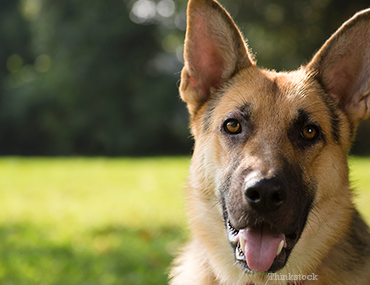Overview
Bloat is a serious and life-threatening disorder that occurs when a dog’s stomach becomes bloated because it’s full of food, foreign material, excess gas, fluid, or foam. It can happen very quickly and should be addressed as an emergency. Bloating is more common in large breeds that have a genetically inherited weakness in the ligament that holds the stomach in the correct position. It is often brought on by a dog gorging on large quantities of food.
Sometimes bloat can be complicated by a deadly condition called gastric dilation/volvulus (GDV) or “stomach twisting.”
Risk
If your dog is older or has a family history of bloat, he may be at greater risk for this disorder.
Larger-breed dogs, those that eat dry food, and ones that perform vigorous exercise are also at risk. Dogs with “barrel chests,” including the Afghan hound, basset hound, boxer, chow, collie, golden retriever, Great Dane, Irish setter, Labrador retriever, standard poodle, St. Bernard, and Weimaraner—as well as dogs of mixed breed that include one or more of these breeds—are also at risk for bloat or GDV. Make sure to keep your dog’s food under wraps to prevent accidental gorging.
Signs
If your four-legged friend has bloat or GDV, you may notice that she suddenly has a distended, swollen belly.
Other signs of bloat and GDV include:
- Retching and nonproductive vomiting (i.e., failure to bring up any material other than small amounts of fluid or foam)
- Restlessness
- Depression
- Sudden weakness
- Collapse
- Pale mucous membranes
- Cool extremities
Because bloat and GDV are life-threatening conditions, call your veterinarian immediately if you see any of these signs.
Test/Treat

Only your veterinarian can determine if your dog is suffering from bloat or GDV. To confirm the diagnosis, your veterinarian will perform a thorough physical exam and obtain radiographs (x-rays).
Additionally, if a surgical or anesthetic procedure is necessary, your veterinarian will recommend presurgical blood work.
This may include:
- Urine tests to rule out urinary tract infection and to evaluate the ability of the kidneys to concentrate urine
- Chemistry tests to evaluate kidney, liver and pancreatic function as well as sugar levels
- A complete blood count to rule out blood-related conditions
- Electrolyte tests to ensure your dog isn’t dehydrated or suffering from an electrolyte imbalance
- Other specialized tests, such as lactate levels
If your veterinarian determines that your dog has bloat, they may perform a procedure that decompresses the stomach by removing the gas through a tube or large needle. Depending on the cause and severity of the bloat, your veterinarian may administer intravenous fluid therapy and other treatments specific to your pet’s needs.
If your veterinarian determines your dog has GDV, immediate surgery to untwist and resposition the stomach will be necessary. Postoperative care will be required; your veterinarian will discuss the specific course of treatment for your dog.
Prevention
There is no way to definitively prevent bloat or GDV from occurring, but the following tips may help.
Talk to your veterinarian about which of them are right for your pet:
- Feed your dog smaller meals more frequently
- Allow your dog smaller amounts of drinking water more frequently
- Try to limit brisk exercise right after your dog eats
- Keep your dog away from garbage or unknown food sources that may cause gas or other problems
Remember: Call your veterinarian immediately if you notice that your pooch’s belly is distended or swollen!
If you have any questions or concerns, you should always visit or call your veterinarian – they are your best resource to ensure the health and well-being of your pets.
